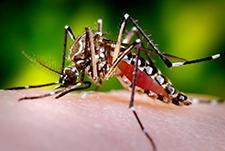The following are key points communicated today, 6/21/16, by the CDC and the GA American Academy of Pediatrics about What do We Know & How to Protect against the ZIKA virus (ZIKV).

The ZIKA carrying mosquitos are daytime, opportunistic and agreesive feeders on man , dometic and wild animals. They love shady, near-ground areas and feed in the early morning and late afternoon.
For Women and Men of Reproductive Age Who are Considering Travel to Areas with Active Transmission of Zika Virus (ZIKV)
Zika Travel Information: http://wwwnc.cdc.gov/travel/page/zika-information
Traveler should stay in hotel rooms or other accommodations that are air conditioned or have good window and door screens to keep mosquitoes outside.
Zika Prevention Information: http://www.cdc.gov/zika/prevention/index.html
For mosquito bite prevention, use insect repellent, appropriate clothing (including permethrin-treated clothing), and bed nets.
Many people, about 80% of those infected with ZIKV, won’t have any symptoms or will have only mild symptoms. The most common symptoms of ZIKV disease are fever, infection symptoms of rash, arthralgias, and conjunctivitis; other common symptoms include myalgia and headache. Illness usually lasts about a week.
ZIKV infection during or just before pregnancy may cause poor pregnancy and infant outcomes, including birth defects. Guillain-Barré syndrome is possibly triggered by ZIKV in a small proportion of infections, as it is after a variety of other infections. People who have possibly been exposed and develop symptoms consistent with ZIKV disease should see a healthcare provider and report their recent travel. If travelers develop symptoms of ZIKV disease, they should rest, stay hydrated, and take acetaminophen for fever or pain. To reduce the risk of hemorrhage, aspirin or other NSAIDs should not be taken until dengue can be ruled out.
When travelers return from an area with ZIKV, they should take steps to prevent mosquito bites for 3 weeks even if they have no symptoms of ZIKV disease (or for the first week after onset if they develop symptoms) so they do not pass ZIKV to mosquitoes that could spread the virus to the community.
So far there have only been 25 persons with ZIKA disease diagnosed in GA, and ALL have contracted illness from travel outside the USA. Two are pregnant and one developed ZIKV illness from sexual contact with a person who traveled to a ZIKV area.
ZIKV can be passed to the unborn child during pregnancy or at delivery if a woman is infected around the time of conception or during pregnancy. ZIKV infection during pregnancy can cause microcephaly (small head size) and other severe fetal brain defects. Children with microcephaly often have serious problems with development and can have other neurologic problems, such as seizures. ZIKV has been linked to other problems in pregnancies and among fetuses and infants infected with ZIKV before birth, such as miscarriage, stillbirth, defects of the eye, hearing deficits, and impaired growth. There is no evidence that ZIKV infection poses an increased risk for birth defects in future pregnancies after the virus has cleared from the blood.
CDC recommends that women who are pregnant NOT travel to any area with active ZIKV transmission.
If a pregnant woman must travel to one of these areas, she should talk with her doctor about potential risks and the steps she should take to prevent mosquito bites during the trip. If a traveler is planning to try to conceive either while traveling or after returning, there are important recommendations s/he needs to be aware of, including waiting to conceive. There are different recommendations for women and for men based on whether or not they develop symptoms consistent with ZIKV disease during or after travel (see table below).
ZIKV can also be transmitted through sex with a male partner. Men might be bitten by a mosquito and become infected with ZIKV and then infect their sex partners.
Patients should be advised to take the following steps to protect themselves from sexual transmission of ZIKV:
1. If a man develops symptoms of ZIKV disease, he should use a condom the right way, every time he has vaginal, anal, or oral (mouthto-penis) sex or should not have sex for 6 months after illness starts.
2. If a man does not develop symptoms of ZIKV disease, he should still use condoms for at least 8 weeks after the last date of exposure (the last day he is in an area with active ZIKV transmission) to avoid sexual transmission to his partner. This is especially important if he has any plans to try to conceive with his partner after returning from travel. To avoid conceiving for the advised periods of time (see below), a woman or couple should also use the most effective contraceptive methods that can be used correctly and consistently (See Effectiveness of Family Planning Methods: http://www.cdc.gov/reproductivehealth/unintendedpregnancy/pdf/contraceptive_methods_508.pdf).
Length of time to wait to conceive after travel to areas with active Zika virus transmission:
One or more symptoms of ZIKV disease (fever, rash, arthralgia or conjunctivitis) Female traveler- Wait at least 8 weeks after symptom onset to try to conceive
One or more symptoms of ZIKV disease (fever, rash, arthralgia or conjunctivitis) Male traveler- Wait at least 6 months after symptom onset to try to conceive with partner
NO symptoms of ZIKV disease (fever, rash, arthralgia or conjunctivitis) Female traveler- Wait at least 8 weeks after last date of exposure to try to conceive
NO symptoms of ZIKV disease (fever, rash, arthralgia or conjunctivitis) Male traveler- Wait at least 8 weeks after last date of exposure to try to conceive with partner
This information is subject to change as additional ZIKA info is obtained and understood by the CDC and Public Health.
Dr. T
